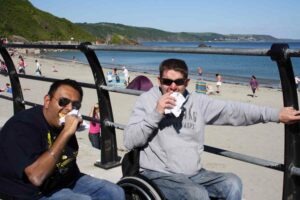Education on disability is important and helps people manage, work with, and deal with their personal situation. This can be directly connected to their individual needs or connected someway to a loved one or friend. Medical professionals will supply some education to a patient to enable them to live as independent a life as possible. But do they just go through a checklist of guidelines, set by an individual who sits in an office and has a degree?
One of the best forms of education comes from peers. People with similar needs. Sharing information, details and tips to help people manage their lives. These can be life skills, such as ‘how to reach something in a high cupboard’, or tips for personal care. People can get stuck in a particular routine and not consider trying anything new for risk of making a mistake. Or just not having the courage to attempt a change in regimen.
Meeting peers can be the tricky thing
I have a T4 complete Spinal Cord Injury and after discharge I spent seven years not knowing anyone else with a physical need. Was this a personal choice? I don’t recall. I wasn’t interested in playing sports, which would have given me ample opportunities to meet people in similar situations to my own, I just wanted to get back to work. The seven years before I met a peer were spent working and socialising with a group of able-bodied people of similar age and interest – i.e. we all either went to school together or lived in the same village, we all got up everyday and grafted, and met in the pub for social interaction. These were my peers at this stage of my life, but none of them were living with a physical challenge.
I believe this is where things started to go wrong for me. My friends and people I knew, and still know, at the time treated me as I wanted. The same as anyone else. The only different, special treatment I received was being helped back into my wheelchair after I had fallen out. I played on the same pool table as them, used the same dart board, fished the same swims and drank the same amount of alcohol, got up everyday and went to work.
The Difference a Peer can Make
When I met my first peer with a disability, and got to know them well, I was in my eighth year of living with SCI. I remember sitting at my desk at work, this was on an assembly line creating mobile phone antennas. I had been there about six years working alongside agile folk, when a new starter rolled up to me to introduce himself. This recently recruited employee worked in the warm office space, on a computer… I had limited knowledge of computers at this stage! It turned out that my new friend had sustained a spinal injury as a young teenager and this was his first employment opportunity after graduating from University. I was pleased to make his acquaintance and amazed as he had a neck injury, drove a bigger car than me, a four door, and had just completed University.

Moving on twenty years and myself and said colleague have stayed good friends. We have holidayed together and spent evenings sharing stories of success and mishap. Complementing each other and correcting when misjudgment has been made.
I am lucky to know this peer. We now have separate jobs, I run my own business and have received advice and guidance from him. He is now a high flying businessman, who travels the world breaking deals.
Sharing is Caring
Being able to share stories with someone who knows personally what I’m going through makes life a lot easier. Whether it’s on the sidings of a race track at training, on the time out during a team game, sitting next to someone supporting a team or watching a gig, or even chatting to someone online, having peers to talk to can help people get through tough times. Sharing information can help improve quality of life. Be a relief from some of the struggles life can set on people.
When I started Freedom Wheelchair Skills, I had no experience of running a business, only experience of skills training. Being part of the Kandu group has been a great benefit. As the group members have experience of running businesses, and some members have similar physical challenges, it has been invaluable to share advice and support.
Stuart Wheeler (Freedom Wheelchair Skills)